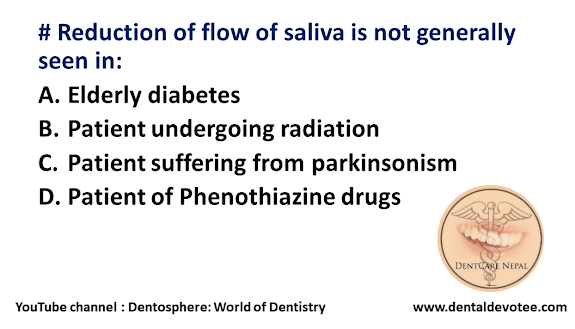# Reduction of flow of saliva is not generally seen in:
A. Elderly diabetes
B. Patient undergoing radiation
C. Patient suffering from parkinsonism
D. Patient of Phenothiazine drugs
The correct answer is C. Patient suffering from Parkinsonism.
Xerostomia : It is the subjective clinical condition of less than normal amount of saliva. It is dryness of mouth, which is a clinical manifestation of salivary gland dysfunction.
Causes:
- Radiation induced
- Pharmacologically induced xerostomia—there are about 500 drugs which can cause xerostomia. The classes of drugs which cause xerostomia include anticonvulsants, antiemetics, antihistaminics, anti-hypertensives and antispasmodics. The mode of action for decreased salivary flow is generally related to the para-sympathetic activity, usually an antimuscarine effect.
- Smoking, Mouth breathing
- Developmental—developmental abnormalities of salivary glands, tumors, autoimmune states and certain diseases which affect afferent or efferent portions of neural transmission reflex
- Systemic alternations resulting in xerostomia
• Nutritional—certain deficiency states like pernicious anemia, iron deficiency anemia and deficiency of
vitamin A and hormones can cause xerostomia.
• Fluid loss—fluid loss associated with hemorrhage, sweating, diarrhea, vomiting.
• Diabetes mellitus—it is associated with xerostomia.
• Sjögren syndrome—xerostomia is also common in Sjögren syndrome.
• Other disease—systemic diseases, which are accompanied by high temperature and dehydration, usually result in diminished salivation. Xerostomia may also be found in HIV infection, sarcoidosis, and graft versus host resistance.




No comments:
Post a Comment
Add Your Comments or Feedback Here